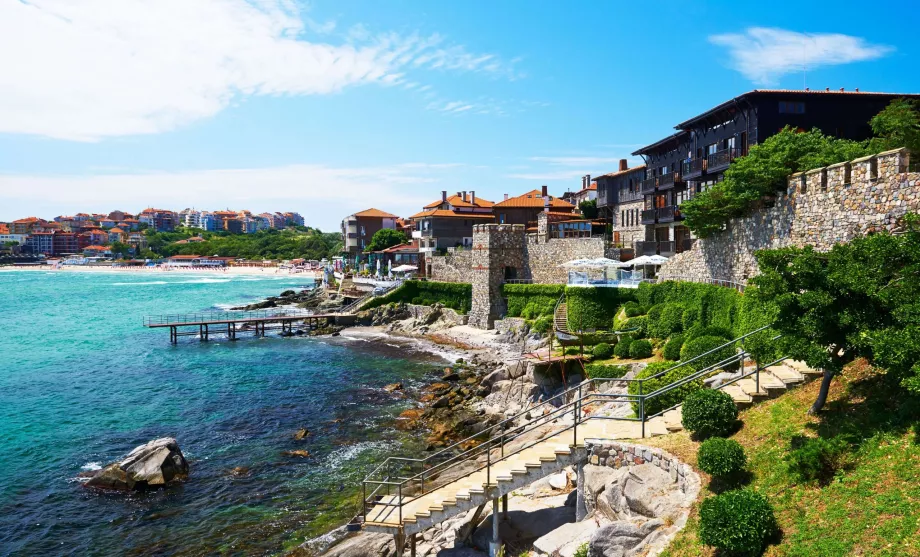Safety and security in Bulgaria

What are the health risks in Bulgaria? Is it safe and where are the places with the highest crime rates?
Health risks
There are no health risks to worry about in Bulgaria. There are similar rules and practices (regarding health risks) as elsewhere in the EU.
The risks arise mainly from the activities you will be undertaking in Bulgaria.
The sea here tends to be relatively calm, but larger waves can still occur. If you are not a skilled swimmer and the sea is rough, it is best not to swim.
When hiking in the mountains, always remember to have plenty of water and food, and also to allow for the possibility of a quick and unexpected change in the weather.
Drinking water
Although tap water is officially drinkable, it is more recommended to drink bottled water. However, you will definitely not have a problem with tap water for brushing your teeth.
Dangerous animals
What animals to look out for when out in the countryside?
Marine animals
Swimming in the sea is very safe in Bulgaria.
There are sea urchins in shallow waters and jellyfish in some places, but neither animal is life-threatening, although they can cause painful injuries.
There are no dangerous sharks in the Black Sea.
Stray dogs
Like everywhere in the Balkans, you will encounter stray dogs in Bulgaria, especially in the countryside.
In big cities or seaside resorts, stray dogs are minimal or non-existent.
In the countryside, stray dogs often have owners. However, it is common for dogs to run free in villages. Stray dogs are usually not aggressive, but should still be avoided as they can carry various infections.
Rabies, although not completely eradicated in Bulgaria, is still very rare.
Bears, snakes and other animals
Bulgaria has very large and dense forests and several high mountain ranges, which is an ideal environment for the brown bear.
Bears are relatively abundant in Bulgaria in all mountain ranges, however interaction with humans is quite rare and avoided by bears. If you do see a bear, definitely try to avoid contact at all costs.
It is a good idea to carry bear spray with you when hiking in the mountains just in case.
Of the poisonous snakes, the horned viper is found in Bulgaria, both in the lowlands and in the mountains. However, it is a very shy species of snake and bites are rare.
Health care and treatment
The quality of medical facilities in Bulgaria is noticeably lower than in Western Europe, but still on a European level and you will always receive relatively good quality care if you have a problem.
Every citizen of the European Union is entitled to free treatment in government-funded hospitals and clinics on presentation of an insurance card.
All tourists should note that treatment on presentation of an insurance card only covers essential expenses and in the event of more serious injuries it is better to take out travel insurance with your insurer beforehand.
Pharmacies are plentiful in Bulgaria and their quality is good.
Compulsory vaccinations
Vaccinations are not required for Bulgaria. This is a developed country where there are no exotic diseases.
Crime
Crime increases significantly in the summer months in touristy areas. These include pickpocketing, robbery of hotel rooms and car theft. Despite this, Bulgaria is a very safe country worldwide.
Serious and serious crime is very low in Bulgaria, but theft and fraud are more common than in Western Europe or the USA.
Book a hotel by the sea at a discount
Disaster risk
The risk of natural disasters is low in Bulgaria.
The country is not in an earthquake zone and prolonged heavy rains are rare in Bulgaria, so the risk of flooding is not too high either.
However, there can be an increased risk of fires in summer, so under no circumstances start a fire or throw away cigarette butts while outdoors.
Important contacts
You should know the following telephone numbers when in Bulgaria.
- European emergency line: 112
- Health: 150
- Police: 166
- Fire brigade: 160
- Traffic police: 165
- Roadside assistance: 146
The international telephone code for Bulgaria is +359.
Any questions left?
If you have any questions or comments about the article...

